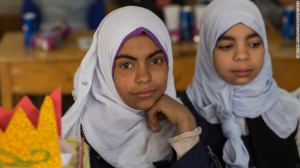
The practice of female genital mutilation (“FGM”) has many psychological, emotional, and physical effects. The international community recognizes the practice FGM as a human rights violation. There has been a global effort to eradicate the practice by both firmly categorizing FGM as a human rights violation and by making the practice illegal in countries where it is practiced. Despite these efforts, and despite the increasing awareness of the risks linked to FGM, millions of young girls are still affected today. This is because condemnation by the international community and even successful efforts within countries to make FGM illegal have done very little to change the social and cultural realities surrounding the practice. Until that happens, FGM will continue to effect women across the globe.
Currently, countries such as Somalia, where the rate of FGM is 98 percent, are considering passing legislation that will make FGM illegal. Making the practice illegal is an important step, however, simply changing the law will not, on its own, eradicate FGM. In Egypt, for example, although the practice has been illegal since 2008, the rate of FGM for married women is still at 92 percent. Furthermore, despite the fact that a doctor was recently convicted of manslaughter for performing FGM (his patient died), many doctors are still willing to perform the procedure. Even countries where FGM has not historically been woven into the fabric of society are struggling with eliminating the practice. For instance, in the United States, where FGM has been illegal since 1996, “the number of women at risk for female genital mutilation has practically doubled in the last decade.”
The continued pervasiveness of FGM, even in countries where it is explicitly illegal, is due to the fact that it is deeply woven into the fabric of society in many cultures around the world. Whether or not a girl goes through FGM is directly linked to her marriage prospects and to her acceptance into society. So for a family to forge the procedure or for a girl to refuse the procedure can have lasting and devastating effects. One girl in Sierra Leone was pulled out of school for two years for bringing shame on her family for refusing.
Legal action and international condemnation usually ignore these important cultural issues. The “knee-jerk” reaction in Western cultures is to completely demonize FGM and ignore sincerely held cultural beliefs. However, it turns out that one culture judging and attacking another does absolutely nothing to change the minds and practices of the judged culture. FGM is no exception.
The reality of the situation is that education and uniting the community are the keys to eradicating FGM. This approach must take into account the traditions and ancient cultural roots of FGM so as to not alienate communities. This is because the entire community needs to come together for this goal to be achieved. Especially since it is the adults who are ensuring and, in some cases, forcing children to go through the process. Without collective and coordinated action in the community, social pressures will continue to allow FGM to flourish.
Simply making something illegal without also changing cultural attitudes underling a practice will do little to eradicate the practice. Neither will condemning the practice outright and without any attempt to understand the underlying reasoning for the practice to continue. The increased international attention to the harms caused by FGM, and the attempts by some countries to eradicate the practice through passing legislation, are important. However, for the sake of the millions of girls still at risk of the procedure, more needs to be done. It is only by addressing the cultural issues realistically and sensitively that FGM can be reduced and hopefully eradicated globally.
Allison Derschang is a 3L at the University of Denver Sturm College Law and a Staff Editor on the Denver Journal of International Law and Policy

